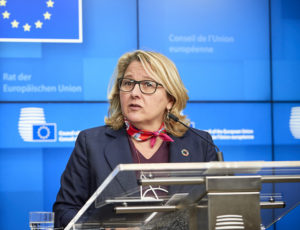
Svenja Schulze, 53, will be the third woman to hold the post. According to Olaf Scholz, she is the “right person” to head the Ministry of Cooperation and Development, a central ministry for anchoring Germany in the world.” The future Chancellor described his function as follows: “We must ensure that there are good prospects for development everywhere, we must fight against hunger and poverty. But we must also ensure that, for example, our world is less threatened by climate change and the climate refugees that could result from it”.
The chair of the meeting and ex-German Federal Minister for the Environment, Nature Conservation and Nuclear Safety Svenja Schulze said: “Our political family, with the Portuguese and German Presidencies in the Council, the S&D Group in the Parliament and Executive Vice-President Timmermans at the Commission, played a key role in reaching an agreement on EU climate law. The next step is to look at what we need to achieve that goal.
“Changes are needed across a range of interconnected policy areas and economic sectors. It is essential that we have a coherent approach which carefully takes into account the social dimension. As socialists and democrats, we must ensure that the path to decarbonization is fair and involves everyone.
Svenja Schulze reiterated her opposition to the inclusion of nuclear energy in the EU’s green finance taxonomy.
“We don’t want nuclear energy, we don’t see it as sustainable and we don’t want the EU to support it either,” Schulze told.
The German position on this matter is clear and “we are not the only ones to see it this way”, said Schulze. According to her, no decision has been taken on nuclear power. According to Schulze, nuclear power is not a solution in the fight against climate change, because it takes too long to build. “Building nuclear power plants is too expensive and takes too long for climate protection,” said the minister.
She then recalled why Germany had decided to phase out nuclear power. “There were two major accidents, Chernobyl and Fukushima. We have made the conscious decision not to do this anymore because it is too dangerous in a densely populated country like Germany.
Schulze’s party, the SPD, is in a difficult position when it comes to the taxonomy of EU green finance. The party has embarked on fossil gas to replace nuclear power, which has increased the country’s greenhouse gas emissions.
As a result, SPD representatives pushed for the inclusion of gas in the EU’s green finance taxonomy while vehemently opposing nuclear, which emits almost zero carbon and is increasingly seen as a ally in the fight against climate change.
France has launched a diplomatic offensive in recent months in hopes of convincing other EU states that nuclear energy should be part of the taxonomy.
At a recent meeting of EU energy ministers, 12 countries rallied around including nuclear power in the bloc’s green finance rules, including the Netherlands and Sweden. Other nuclear energy funders include pro-gas states in Central and Eastern Europe such as the Czech Republic, Hungary, Poland and Romania.
But for the German Greens, taxonomy is not the right place to deal with gas and nuclear power.
Sven Giegold, one of the green negotiators in the coalition talks, acknowledged that Germany would need “small volumes” of additional gas capacity in order to “stabilize” renewable energy on the electricity grid and offset the exit from nuclear power. He said these issues can be addressed outside of the EU’s green finance regulation.
Germany’s new government is expected to facilitate investments of 860 billion euros by 2030 to launch emissions reduction activities in all sectors of the economy, the industry association BDI said.
The “traffic light” government made up of the social-democratic SPD, the Greens and the liberal FPD is less than nine years from the deadline to achieve the country’s ambitious climate goals. “The pressure on policymakers to achieve climate neutrality by 2045 while preserving a competitive industry is immense,” said Siegfried Russwurm, President of the BDI.
The central element of the “investment turbo”, which is around 1 trillion euros over less than ten years, should be the modernization and upgrading of the country’s infrastructure “which goes far beyond what has been planned so far,” said the association.
In addition, the rapid expansion of renewable energy sources is expected to be complemented by the construction of new gas-fired power plants that can run entirely on green hydrogen from renewable energies.
The Greens and the SPD clash over whether gas should play a role in the transition to renewables. “If we cannot finance gas, coal will be extended,” Svenja Schulze said at COP26 in Glasgow on November 11, 2021.
“Investing in fossil gas and nuclear should not be green by putting it in the taxonomy,” Sven Giegold, environmental MEP and one of the main negotiators of the coalition agreement, told. “We accept that there will be investments – on an interim basis – in fossil gas power plants to help phase out coal,” Giegold told. “However, gas should not be included in the taxonomy,” he insisted.

















